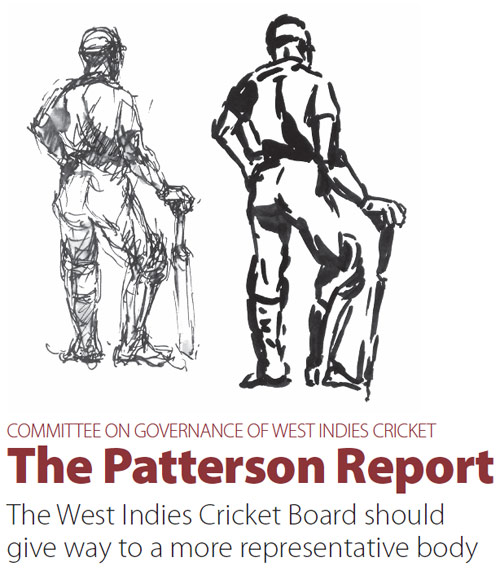 |
 |
 |
|
March 2015 |
(1) Governance of West Indies Cricket * There is a disconnect between the private cricket institutions and public ownership of the game; We intend to address these concerns in advising how the WICB should be set up and run. Changes are essential. A new departure is urgent. Organizational Requirements and Structure Because of its diffusive character, the organizational structure for cricket should be sufficiently de-centralized to allow the exercise of local initiative, while at the same time providing adequate opportunities for the regionalization of management where there are evident economies of scale and scope to be realized. Accordingly, any constitution for West Indies cricket should continue to provide for a management structure, based on a regional entity linked to and in close interaction with territorial bodies. There is little doubt that the present structure is too unwieldy; nor does it provide sufficient scope for involvement and participation by all the major stakeholders. The West Indies Cricket Board should give way to a more representative body. One clear option entails the creation of a West Indies Cricket Commission, enabling representation of all major interest groups, e.g. territorial boards, players and officials, women, the Caribbean Community, the private sector and civil society. When the membership of the Commission has been chosen, it would then appoint the chairman. Such a Commission would meet bi-annually and be responsible for approving the policies, programmes and budget. A modified approach could be to establish a nominating body comprised of nominees of the Cricket Boards, the Governments, the West Indies Players’ Association, past players, the regional private sector and the media to identify, interview and nominate the directors. Even if final selection is to be dominated by the Territorial Boards, it should be limited to the list of names submitted by the nominating body. (Such a format is not unlike that which now exists for the nomination of Judges of the CCJ.) In either option a small executive body, appointed by the Commission/Board should be charged with implementation of the work programme and management of the budget. Such an executive body may have some territorial representation, but the aim is to provide members with the necessary expertise in areas such as marketing, finance, business negotiations and corporate law. Yet another option is for the WICB to be run as a publicly listed company on regional Stock Exchanges, with directors accountable to shareholders, replete with an annual general meeting. This could also help to raise much needed capital and give the Caribbean public a sense of ownership. Such a broad share-ownership structure would be spread among regional institutions, Territorial Boards, CARICOM companies and nationals (resident or abroad), WIPA. There would need to be safeguards against appropriation of the Board by special interests. Caps would have to be set, and the voting power so arranged as to avoid control ending up in the hands of a limited number of persons and corporations or result in a populist system which could stultify effective decision-making. No matter how the Board is chosen, there must be a clear delineation between the role of the Board as a policy making and monitoring entity and that of the management and staff as the executing arm. “The Board should not attempt to micro-manage every aspect of the game.” When the Board gets embroiled in administrative details, or in a daily quarrel with the simplest of things, its authority and credibility become severely undermined. * No Board can operate properly where trust does not exist, when discussions and decisions are constantly leaked. * Transparency and confidentiality are not conflicting requirements for successful corporate managements. The Board should be so comprised and its affairs handled in a manner where conflicts of interests do not determine or influence the conduct of its business. In general, the Secretariat must have the requisite professional competence, efficient support staff and be suitably equipped to become a high effective corporate entity. It needs to maintain close links with all member territories and other associated interests, such as sponsors, regional Governments and organizations responsible for cricket in other countries. As currently exists, a Chief Executive Officer will be appointed who is responsible to the Board/Commission for the execution of its programme and management of its affairs. A complete management audit with the Board’s staff will become necessary, but at present we suggest that: The CEO will be supported by three divisions – - One dealing with Operations that will include units responsible for team performance, finance, marketing and the management of tours and competitions; - Another will be responsible for the servicing of the Board and its subsidiary bodies, as well as communications and public relations; - The third unit will be responsible for cricket development and that will include the Academy system, training for other cricket personnel such as coaches and umpires, the placing of young players abroad, the 15-19 regional competition, and all other matters having to do with the development of players and the game. The full report can be found online at http://www.windiescricket.com/sites/default/files/documents/Committee-on-Governance-of-West-Indies-Cricket-Final-Report.pdf |


 This is an excerpt from the 'aide memoire' submitted by the Committee on Governance of West Indies Cricket, set up by the West Indies Cricket Board. The Committee, chaired by former Jamaica Prime Minister PJ Patterson, included Ian McDonald and Sir Alister McIntyre. The final report was presented in October 2007.
This is an excerpt from the 'aide memoire' submitted by the Committee on Governance of West Indies Cricket, set up by the West Indies Cricket Board. The Committee, chaired by former Jamaica Prime Minister PJ Patterson, included Ian McDonald and Sir Alister McIntyre. The final report was presented in October 2007.